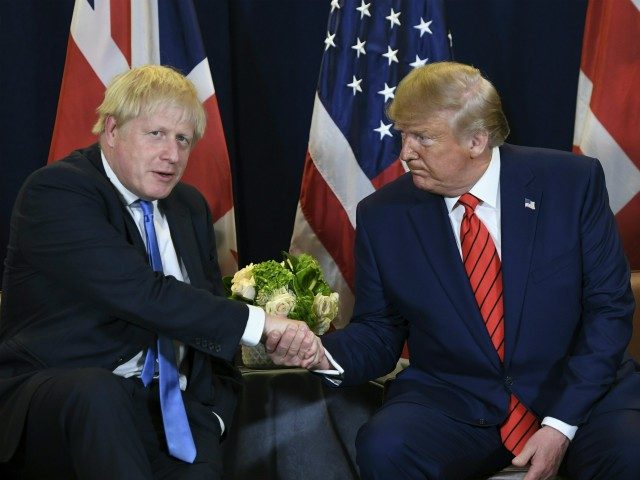After Theresa May’s Brexit delays and the coronavirus lockdown, the long-awaited UK-U.S. trade talks began on Tuesday.
U.S. President Donald Trump supported the UK’s vote to leave the EU and from early on in his presidency, pushing for a “massive new trade deal” between his country and the United Kingdom.
While Britons voted to leave the EU on June 23rd, 2016, then-Prime Minister Theresa May did not trigger Article 50 — the legal mechanism for leaving the EU — until March 2017 and then delayed the country’s exit twice. A further delay forced on her successor Boris Johnson pushed Brexit until January 31st, 2020. Before that official exit date, the UK was not allowed to begin formal free trade negotiations with other countries.
Even during the current transition period, the UK may negotiate but cannot activate new trade deals until she is finally out of the EU’s institutions on January 1st, 2021.
Politico reported on Monday that talks between British and American negotiators would begin today, albeit virtually through video conferencing due to the Chinese coronavirus pandemic. Secretary of State for International Trade Liz Truss will hold a video call with her American counterpart, Robert Lighthizer, with around 100 negotiators from both sides of the pond listening in.
Ms Truss has said that it was “essential” to strike a good deal with the United States to ease the economic burden caused by the lockdown, with ministers believing that a UK-U.S. deal could provide a £15 billion boost to the British economy.
This first round of talks is expected to last two weeks, with further rounds every six weeks. Both countries hope to lower tariffs on their goods being shipped abroad, with the UK hoping for concessions on cars, ceramics, and foods, to make agreements on financial services and data, and to forge deals beneficial to Britain’s small businesses.
The British also hope to use progress on a U.S. trade deal to put pressure on the EU, which is demanding the UK maintain regulatory alignment with the bloc and the continued surrender of her territorial fishing waters.
It’s a Trap! Nigel Farage Warns EU Will Use Coronavirus to Prevent Brexit https://t.co/q9pgMAXADe
— Breitbart London (@BreitbartLondon) May 4, 2020
Meanwhile, the Scottish National Party’s (SNP) Westminster leader Ian Blackford has become the latest Remainer to call for the transition period, which ends on December 31st, to be extended for another two years because of coronavirus.
In a letter to party leaders and reported by The Herald, Mr Blackford wrote: “The ongoing emergency caused by the Covid-19 virus is, and must remain, the sole focus of our collective efforts, and it is right that all other political agendas are paused as we deal with the priority of saving lives and protecting people’s incomes.
“In that context, I believe now is the right moment to unite as opposition parties in Westminster in seeking a two-year extension to the Brexit transition period.
“That strong, united opposition stance would also send a powerful message to our European friends and partners, who we know are favourable to the logic and sense of this request.”
However, diplomatic sources in the EU speaking to The Times last month said that several European countries admitted that it would not make sense for the UK to extend the transition period. They added that any alleged economic impact of leaving the bloc’s institutions, notably, without a trade deal, would be absorbed by the global financial repercussions caused by the Chinese virus.
The British government has maintained that it will not extend the transition period; doing so would threaten the progress of any future free trade agreements with countries like the U.S., Australia, or New Zealand. Senior minister Michael Gove told the House of Commons on Monday that the path of not extending is “plain prudence”. He warned that to “perpetuate our membership of the European Union-lite through the transition period” would result in having to spend more taxpayers’ money.
‘Bigoted Woman’: Two Words that Killed the UK Left and Led to Brexit, Ten Years Ago Today https://t.co/Jl02z04gVQ
— Breitbart London (@BreitbartLondon) April 28, 2020

COMMENTS
Please let us know if you're having issues with commenting.